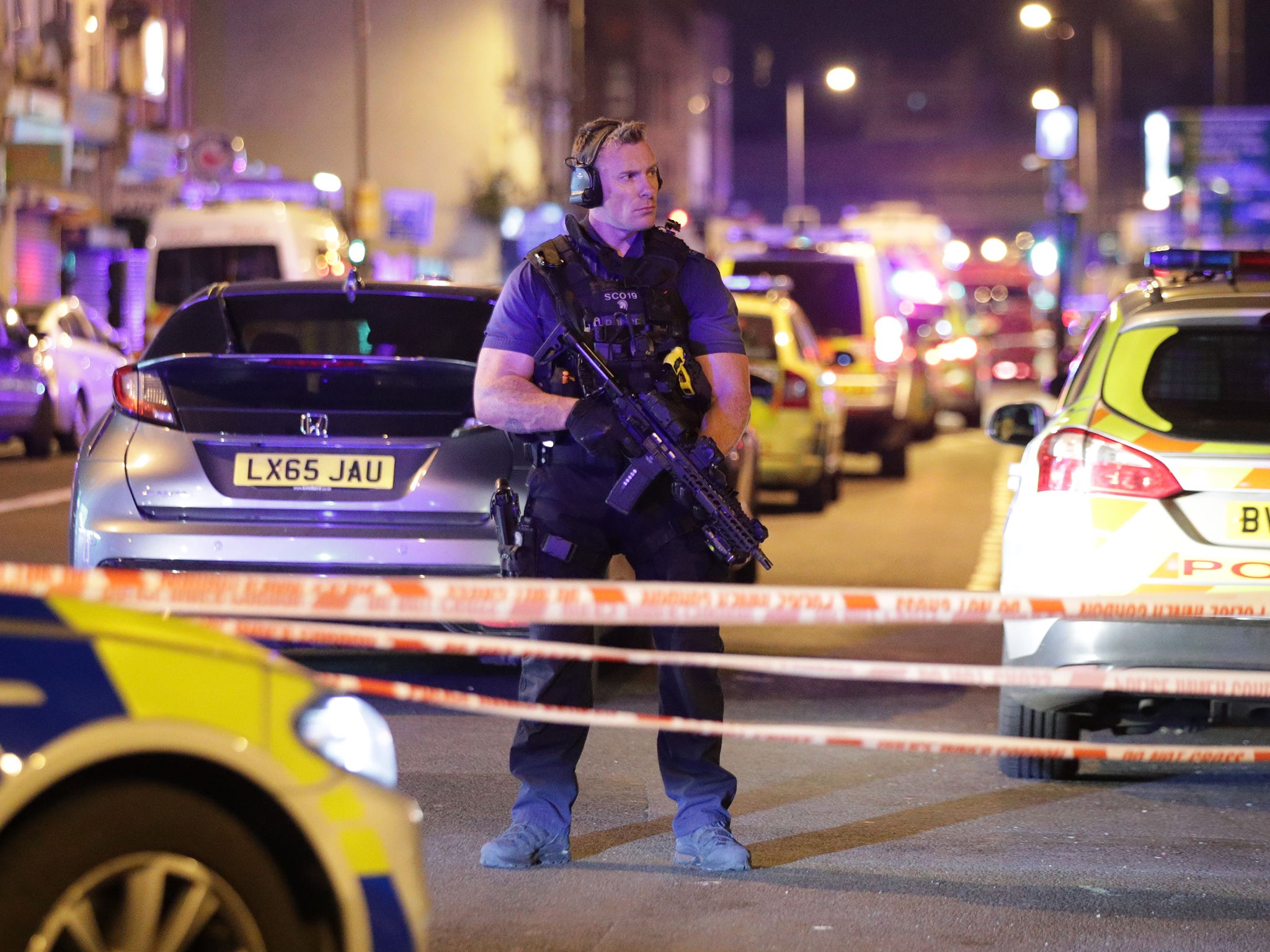Terrorists who ‘self-radicalise’ online are bigger threat than attackers sent by Isis, counterterror chief says
Exclusive: Head of Prevent counterextremism scheme warns of ‘perfect storm’ of online propaganda and mental health crisis

Your support helps us to tell the story
From reproductive rights to climate change to Big Tech, The Independent is on the ground when the story is developing. Whether it's investigating the financials of Elon Musk's pro-Trump PAC or producing our latest documentary, 'The A Word', which shines a light on the American women fighting for reproductive rights, we know how important it is to parse out the facts from the messaging.
At such a critical moment in US history, we need reporters on the ground. Your donation allows us to keep sending journalists to speak to both sides of the story.
The Independent is trusted by Americans across the entire political spectrum. And unlike many other quality news outlets, we choose not to lock Americans out of our reporting and analysis with paywalls. We believe quality journalism should be available to everyone, paid for by those who can afford it.
Your support makes all the difference.Terrorists who “self-radicalise” using online material are a now a greater threat to the UK than those directed by Isis, a senior police officer has said.
The national coordinator for the Prevent counterextremism programme warned that young and vulnerable people, including those with mental health issues, were being exploited.
Chief Superintendent Nik Adams told The Independent: “Our biggest concern is those individuals who are self-radicalising and may go on to become lone actors in the terrorism space.
“That is now a far greater risk for us, in terms of the volume, than individuals who are directed and mobilised by a terrorist organisation overseas to come and attack people in the UK.”
The officer said an “international explosion of propaganda” had made material inciting violence accessible from anywhere in the world.
He spoke as the government continued moves to prevent Isis members from returning to the UK, including by removing their British citizenship and refusing repatriations from Syrian detention camps.
Terrorists who are thought to have “self-radicalised” include the Finsbury Park attacker Darren Osborne and an autistic teenager who planned an Isis-inspired rampage in Cardiff.
“People with mental illnesses or complex needs are now much more vulnerable,” Ch Supt Adams said.
“They’re online and they are accessible to extremists who are seeking to exploit and radicalise them … it’s a perfect storm.”
More than 5,700 people were referred to Prevent in 2018-19 over concerns they were being drawn into extremism.
The largest group – 38 per cent – were individuals with a “mixed, unstable or unclear ideology”, including those who are influenced by different elements or present another form of risk.
The cohort eclipsed suspected Islamists and right-wing extremists, who each made up 24 per cent of referrals.
Ch Supt Adams described them as “people who either have no clear politically or racially motivated ideology” but may be driven by obsessions including mass shootings or school massacres.
Prevent aims to stop people’s journey into extremism before they become a security risk or commit terror offences, but the change has been mirrored in recent court cases.
In July 2018, two teenagers were jailed for planning what a judge described as a “re-enactment of the Columbine massacre” at their Yorkshire school.
Aged just 14, Thomas Wyllie and Alex Bolland had idolised the boys who murdered 13 victims at Columbine High School in Colorado in 1999.

Wyllie espoused “far right-wing ideology” but wrote in a journal that his main focus was “committing one of the worst atrocities in British history” and killing classmates he held grudges against.
The Columbine shooting has been an inspiration for numerous terror plotters, including white supremacist Shane Fletcher.
He was jailed in April for planning to attack a football match in Workington, after being referred to Prevent but refusing to engage with the programme.
Fletcher’s trial heard that his motive was “hatred and a desire for revenge” for school bullying, and his inability to find work or make a meaningful life for himself.
Then in September, 16-year-old Kieran Cleary was jailed for trying to make a bomb and threatening to “go on a rampage”.
As well as neo-Nazi and anti-Muslim material, he had focused on Columbine and threatened to carry out a school shooting himself.
A judge said he “did not appear to hold any particular ideology” but had become desensitised to graphic images and was “prone to violence and dark and homicidal thoughts”.
He had also been referred to Prevent, as had an Isis supporter who planned to attack Downing Street and the Parsons Green bomber, Ahmed Hassan.
Ch Supt Adams admitted there were “gaps in provision and communication” over Hassan that had resulted in updated guidance and training.
But he said case management processes should catch any security risks, and around 4 per cent of Prevent cases are passed to the police.
“Because Prevent is voluntary, it’s not always going to work,” he added. “Individuals who are referred are by their very nature quite risky and may have entrenched views.”
The government launched a review of the scheme last January, after years of allegations that it discriminated against Muslims and violated free speech and religion.
But the probe has been beset by controversy, seeing Lord Carlile leave his post as independent reviewer after a legal challenge accused him of bias.
A Home Office spokesperson said it would not be contesting the case brought by Rights Watch UK, adding: “The next steps for the review will be considered in due course.”
Critics claim the review will be a “whitewash” but Ch Supt Adams said police were supporting the process and hoped it would improve public understanding of Prevent.
He argued that the statistics prove the scheme responds to all kinds of extremism, and pointed to falling Islamist cases as an indication that “unnecessary or inappropriate referrals” had gone down.
“We deliver what I think is a really balanced, proportionate, legally compliant programme to safeguard people from terrorism,” the senior officer added.
A rising number of people referred have “complex needs” including mental illness, autism, substance addictions and a history of child abuse.
“They may be more inclined to suffer from fixation and obsession-type issues,” Ch Supt Adams said.
“There is a full plethora of multiple complex needs, and we see that cohort of people growing.”
He added that people drawn into extremism are often looking for belonging and a sense of purpose, and may be diverted through help with employment or their mental health.
Amid a national shortage of mental health provision, particularly for teenagers, the senior officer said it was “key” to preventing radicalisation.
“Support for people within their local communities is pivotal to stopping them from deteriorating,” he added.
“There are an awful lot of people who come into Prevent who we signpost to other services for the first time – they’ve not accessed services, they live isolated lifestyles.”
Half the people referred in 2018-19 were passed on to other services for alternative support, a quarter “required no further action” and 23 per cent were considered by the Channel scheme.
It sees people paired with “intervention providers”, such as imams or former Nazis, to help combat the ideology as their progress is regularly reviewed.
Ch Supt Adams, who hails from Leeds and started his career in neighbourhood policing, warned that “grievance agendas” were being used to draw vulnerable people into terrorism.
He said that the more well-integrated people’s lives are from a young age, the more resistant they are to attempts to turn them against people of different races or religions.
“Everybody needs to take responsibility for either not generating grievances in the first place, or working across communities, within families, to deal with them when they arise,” Ch Supt Adams said. “A whole society approach is needed.”
Join our commenting forum
Join thought-provoking conversations, follow other Independent readers and see their replies
Comments